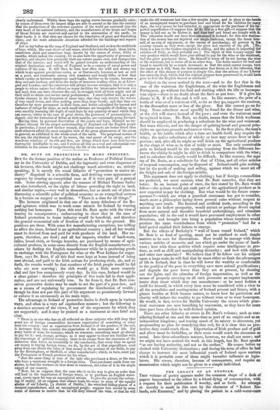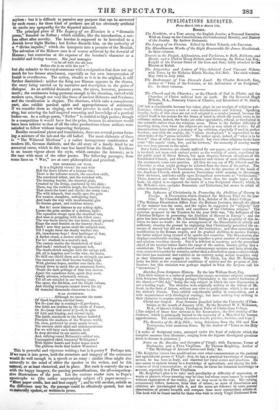THE LEGACY OF AN ETONIAN.
Tins volume of poetry appears under the common shape of a desk of papers bequeathed to the editor by a friend dying of consumption, with a request for their publication if worthy, and so forth. An attempt at novelty is made in this case by the character of "Robert No- lands, sole-Executor," and by placing the patient in a cold-water-care asylum : but it is difficult to perceive any purpose that can be answered by such macs; for these kind of prefaces are all too obviously artificial to excite any sympathy for the departed minstrel. The principal piece of The Legacy of an Etonian is a "dramatics
poem," founded on Esther ; which exhibits, like the introduction, a use- less effort after novelty. The heroine is supposed to be betrothed to a Jewish lover bight Harim ; but Esther discards him, on the authority of a "divine impulse," which she interprets into a promise of the Messiah. The salvation of the Hebrew race is of course achieved by the dowufal of Haman; but somewhat at the expense of the heroine's character as a truthful and loving woman. She just manages "to be off with the old love Before she is on with the new ":
but she submits to the royal summons with a resignation that does not say much for her former attachment, especially as her own interpretation of Isaiah is overthrown. The action, slender as it is in the original, is still further diminished : neither the King nor Haman appears in the drama, the story being carried on by narrative and description in the guise of dialogue. As an artificial dramatic poem, the piece, however, possesses merit ; the sentiments being germane enough to the situation, viewed with modern eyes, though not very like those of ancient Hebrews and Persians ; and the versification is elegant. The choruses, which take a conspicuous part, also exhibit poetical spirit and appropriateness of sentiment, if we consider them as singing, not what persons in such a state would sing, but uttering the half-inspired reasoning and knowledge of a poetical looker-on. As a college poem, "Esther" is entitled to high praise ; though in a competition it would have lost the prize, because its structure would have been inferior to that of all the other productions whose authors were satisfied to follow without improving Scripture.
Besides occasional pieces and translations, there are several poems form- ing a mixture of the tale and the old ballad. The most elaborate of these is "The Withered Mistletoe" ; a rather incongruous combination of modern life, German diablerie, and the old story of a family fated by an ancestral curse, which in this case has lasted from the Druids. Yet there is an innate vigour about the style, which sustains the interest ; as is the case with most of the other poems. The following passages, from some lines on "War," are at once philosophical and practical.
THE MISERIES OF WAR.
it is a frightful vision! far and wide
Roll the fierce billows of a human tide; There is the toilsome march, the ceaseless strife, The murdered infant, and the ravished wife, The burning hamlet, the deserted plain, Crushed by the living, cumbered by the slain: There, too, the reckless laugh, the boastful cheer, That steels the heart and checks the rising tear; The wild debauch, that madly opes the gate For wanton slaughter, unforgiving hate, And leads the way with unsubstantial glee To famine gaunt, and reckless misery.
But Jo! more hideous to my aching sight, Looms the grim outline of a dubious fight: The squadron stoops upon the steadfast van, And man is grappling with his fellow man; The wax-horse meets the war-horse, fiercely pressed Rings the steel frontlet on the brawny chest: Hark ! now they pause amid the mingled roar, Till I might deem the deadly warfare o'er. Ah, treacherous hope ! thou harbinger of fear, A darker cloud, a sterner strife is near; For lol obedient to a mortal's nod, The cannon mocks the thunderbolt of God!
And bark! reechoed by expectant hell, The death-shriek mingles with the savage yell. All, all is hopeless now !—the wise, the brave, No skill can shield them and no strength can save: One moment sees their bosoms beating high With glorious hopes, another sees them die; Struck down to earth like an autumnal flower, 'Neath the dark peltings of that iron shower.
Again the squadrons form, again they meet, Gladly advance, reluctantly retreat, Till all are mingled in one waving mass, The spear, the falchion, and the bright cuirass, And stirring trumpets cannot drown the cry Of wounded thousands clamorous to die.
WAR JUSTIFIED.
Although we execrate the name Of blood-begotten suicidal fame, Yet if--(oar day is coming)—if, perchance, Our fields are trodden by the steeds of France, Or if--(may God avert it !)—if, in spite Of kith and kinship, and eternal right, The battle standards to the breeze unfurled Proclaim the madness of the Western world; Oh, then, preferred by every manly breast, The sternest strife shall end dishonoured rest. For we will bury each domestic broil In deep devotion to our native soil, And, rallying round Britannia's noblest son, Unconqwred chief, immortal Wellington! With lighter hearts and holier hopes renew The glorious deeds that hallo* Waterloo!
This is powerful and vigorous writing; but is it poetry? Perhaps not. If we turn it into prose, both the structure and imagery of the sentences would do well enough in a speech or an essay : similar ideas might rise naturally to the mind of either the speaker or the writer, and be felt natural, or at least rhetorical, and in place. But such is scarcely the case with the happy imagery, the passing personifications, the all-comprehen- sive illustrations of the poet. Let the curious reader turn to Popes apostrophe to (the rather unpromising subject of) paper-money- "Blest paper credit, last and best supply " ; and he will see that, subtile as the difference may be, the passage could be effectively quoted, but not so naturally spoken, or written in prose.



























 Previous page
Previous page